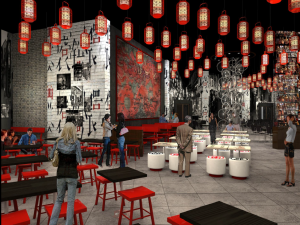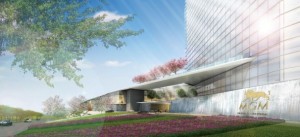The good Dr. David G. Schwartz ponders the significance of Lucky Dragon Casino and begins with one salient milestone: “Lucky Dragon is the first genuinely new property to open in the  tourist corridor since The Cosmopolitan six years ago.” That’s quite a hiatus, all other “openings” being reboots of existing properties, like the attempt to masquerade Imperial Palace as The Linq. (I’ve stayed in Red Roof Inns that were nicer.) “Somebody thought they could make money building a new casino in Las Vegas and convinced enough people to make funding a reality.” Historically, its design — particularly of the gaming floor — is reminiscent of the golden era of the Strip, Schwartz says. But the Lucky Dragon’s significance may extend well beyond its newness and into the different kind of casino marketing it embodies, flouting much conventional wisdom in the process. It’s the first Strip casino conceived exclusively for Pacific Rim customers, both overseas and domestic.
tourist corridor since The Cosmopolitan six years ago.” That’s quite a hiatus, all other “openings” being reboots of existing properties, like the attempt to masquerade Imperial Palace as The Linq. (I’ve stayed in Red Roof Inns that were nicer.) “Somebody thought they could make money building a new casino in Las Vegas and convinced enough people to make funding a reality.” Historically, its design — particularly of the gaming floor — is reminiscent of the golden era of the Strip, Schwartz says. But the Lucky Dragon’s significance may extend well beyond its newness and into the different kind of casino marketing it embodies, flouting much conventional wisdom in the process. It’s the first Strip casino conceived exclusively for Pacific Rim customers, both overseas and domestic.
“Unlike most [if not all] of the Strip, the Lucky Dragon is going out of its way not to be all things to all people,” Schwartz writes. He chronicles several previous “mistakes” that turned out to be precursors of the next wave in Strip development. He even makes the heretical argument that the “big-tent” megaresort is passé in today’s economy: not good news for Resorts World Las Vegas and some of the other vaporware out there. Success in Las Vegas especially breeds imitators and we’ll all be looking forward, I suspect, to what the next narrow-cast casino property will be.
* MGM National Harbor has only been open one day but it’s having a tremendous spillover effect in Maryland. (It also sparked some opening-night fisticuffs.) For instance, Tobar Construction, one of the subcontractors,  had to increase its workforce by nearly 100%. Benchmarks for minority contracting were well-exceeded (164 firms hired) and the company has also reached out to the developmentally disabled workforce of Melwood, which services the conservatory. Factor in National Harbor’s 4,000-strong staff and have you an inspiring tale of a casino development growing the community around it. The casino didn’t get its operational license until the very last minute, after regulators tested its 3,321 slots and 165 table games. Let the action flow.
had to increase its workforce by nearly 100%. Benchmarks for minority contracting were well-exceeded (164 firms hired) and the company has also reached out to the developmentally disabled workforce of Melwood, which services the conservatory. Factor in National Harbor’s 4,000-strong staff and have you an inspiring tale of a casino development growing the community around it. The casino didn’t get its operational license until the very last minute, after regulators tested its 3,321 slots and 165 table games. Let the action flow.
* It’s 10 states’ attorneys general against one: Peppery Nevada congresswoman Dina Titus (D) has waded into the debate over Sheldon Adelson‘s pet project, Restoring America’s  Wire Act. The various and sundry AGs supported Adelson, citing problem gambling and that reliable bogeyman, terrorist money-laundering, as justifications. In a letter to veep-to-be Mike Pence (R), Titus accused the AGs of being guilty of “several inaccuracies and unfair allegations.” While some pundits give RAWA little chance, to paraphrase a great man, preemptive action in defense of liberty is no vice. As Titus wrote to Donald Trump, “I encourage you to carefully study this issue before making any decision that would infringe on states’ rights or eliminate jobs in the gaming industry.” Meanwhile the American Gaming Association is all hot and heavy for the legalization of sports betting nationwide. However, a spokesman for New Jersey‘s Rep. Frank LoBiondo (R) tells sports betting enthusiasts to chill out, saying that the incoming Trump administration’s “aggressive” legislative agenda makes sports betting a low-priority issue.
Wire Act. The various and sundry AGs supported Adelson, citing problem gambling and that reliable bogeyman, terrorist money-laundering, as justifications. In a letter to veep-to-be Mike Pence (R), Titus accused the AGs of being guilty of “several inaccuracies and unfair allegations.” While some pundits give RAWA little chance, to paraphrase a great man, preemptive action in defense of liberty is no vice. As Titus wrote to Donald Trump, “I encourage you to carefully study this issue before making any decision that would infringe on states’ rights or eliminate jobs in the gaming industry.” Meanwhile the American Gaming Association is all hot and heavy for the legalization of sports betting nationwide. However, a spokesman for New Jersey‘s Rep. Frank LoBiondo (R) tells sports betting enthusiasts to chill out, saying that the incoming Trump administration’s “aggressive” legislative agenda makes sports betting a low-priority issue.
* Now that gambling legalization has moved into a committee of the upper house of Japan‘s parliament, that’s good news, right? Maybe not. The committee is chaired by a  member of the opposition Democratic Party, so some horse trading is predicted, especially if the chairman in question is to be persuaded to do Prime Minister Shinzo Abe a solid. The good news is that Abe’s Liberal Democratic Party holds 11 of 20 committee seats plus a majority in the upper chamber. One’s rapture is modified by an investor note from Morgan Stanley which, while projecting the Japanese gaming market at $20 billion, opines, “returns for the operators may not be very high if they spend high capex (up to $US10 billion, according to MGM Resorts and Las Vegas Sands) and if Japan levies high revenue tax.”
member of the opposition Democratic Party, so some horse trading is predicted, especially if the chairman in question is to be persuaded to do Prime Minister Shinzo Abe a solid. The good news is that Abe’s Liberal Democratic Party holds 11 of 20 committee seats plus a majority in the upper chamber. One’s rapture is modified by an investor note from Morgan Stanley which, while projecting the Japanese gaming market at $20 billion, opines, “returns for the operators may not be very high if they spend high capex (up to $US10 billion, according to MGM Resorts and Las Vegas Sands) and if Japan levies high revenue tax.”
* As it expands internationally, daily fantasy sports are projected to be a $5.3 billion industry by 2021. With that kind of money on the line, as it were, the casino industry needs to find a way in and soon.
